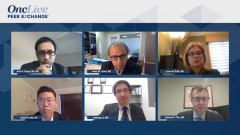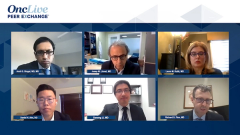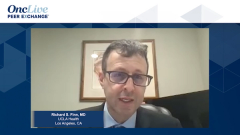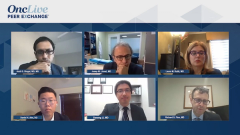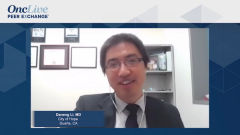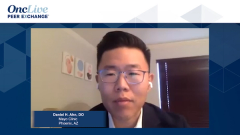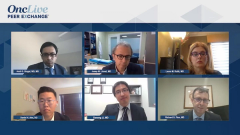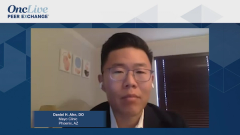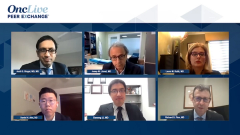
Role of Single Agent IO in Hepatocellular Carcinoma Frontline Therapies
A summary of ongoing clinical data that explore the use of frontline single agent immunotherapy in advanced HCC.
Episodes in this series

Richard S. Finn, MD: Daniel, do you see a role for single-agent I/O [immuno-oncology] in the frontline setting, given that we had negative data from CheckMate 459? And when I say negative, I mean that the primary end point of overall survival didn’t reach its end point vs sorafenib. The response rate was there, around 15%, and the responses were durable. The NCCN [National Comprehensive Cancer Network] comments on this, but is there a population for whom you would consider single-agent I/O?
Daniel H. Ahn, DO: That’s a great question. We published our data in which we did a meta-analysis looking at the phase 3 trials that showed efficacy for all the approved agents. When you look at I/O monotherapy, as you mentioned, all the studies were negative. We looked at CheckMate 459, and we’ve seen the KEYNOTE-224 Cohort 2. When you look at the data, there seemed to be a trend toward an improvement in response rate and PFS [progression-free survival], but the overall survival was ultimately negative.
There are other caveats that we can take into consideration, especially when you look at KEYNOTE-240, which was pembrolizumab vs placebo. Although probably 10% of patients did experience a durable response, with the absence of biomarkers to better elicit or understand which patients are going to respond the best, I wouldn’t recommend I/O monotherapy as my preferred frontline treatment option as some have alluded to. In the cases where a patient would not be a candidate for the anti–VEGF-I/O combination I would probably lean toward using TKIs [tyrosine kinase inhibitors] as those have proven to show a survival benefit consistently with sorafenib, now lenvatinib, and then some other agents such as lapatinib in China and those that may be coming down the pike. That would be my preferred preference in treatment approach.
Richard S. Finn, MD: It’s interesting because if CheckMate 459 had been called a noninferiority study, it would have been considered positive because the confidence intervals were less than the 1.08 threshold that we used for REFLECT. It had a very favorable toxicity profile, but it was called a superiority study.
Ongoing is the RATIONALE-301 study, a study I’ve been involved with that’s looking at a single-agent PD-1 inhibitor tislelizumab vs sorafenib and then powered for noninferiority. It’s interesting because the PD-1 inhibitors have all demonstrated similar activity, at least in smaller phase 2 studies and even, I would argue, in phase 3 studies. If it meets its end point, that may provide level 1 evidence that single-agent I/O may be an option for a subset of patients who can’t get a VEGF inhibitor, whether it is an antibody or a TKI. I look forward to seeing those results.
A program that has moved a little slower than others but carries the same hope of activity is regorafenib in combination with I/O.
Josep, there have been studies of regorafenib-nivolumab, and regorafenib-pembrolizumab. Regorafenib is the first new TKI approved and the first drug approved after sorafenib in liver cancer, so we’re starting to see these combinations.
Josep M. Llovet, MD: I will comment briefly. As you know, this was disclosed at ASCO GI [American Society of Clinical Oncology Gastrointestinal Cancers Symposium], the combination with regorafenib and pembrolizumab at that timepoint. There is also a head-to-head study of the combination regorafenib-nivolumab vs TACE [transarterial chemoembolization] in patients with intermediate HCC [hepatocellular carcinoma]. The study is called RENOTACE, which looks at regorafenib-nivolumab vs TACE alone in those patients with beyond up-to-7 criteria. Now there is a move to bring regorafenib to the frontline setting. It is a very active drug. Of course, the toxicity profile will likely not be as good as sorafenib, but regorafenib is more powerful. Regorafenib will be there and will be tested still in patients with intermediate-stage HCC in the in frontline setting.
I want to make a comment regarding single agents. It would be nice if the RATIONALE-301 trial was negative to have a biomarker, because I am positive that patients who respond to a single-agent checkpoint inhibitor have a median survival beyond 30 months. By far, it’s much better and less toxic than atezolizumab-bevacizumab.
But let us be clear, we have been unlucky with these trials, in the front line with CheckMate 459— you have had the second watch for noninferiority increasing the sample size, which have been positive. Also, you were leading the trial of pembrolizumab in the second line, but you experienced some bad luck.
I think these drugs have a value, and we need to rescue these drugs as single agents.
I have another comment if I can about the comparison of the nivolumab-ipilimumab in the front line and TKIs and anti–PD-1 inhibitors in the front line. With the data that are out there, my feeling is that the trials will drive the final disease. But when you are combining an anti–PD-1 inhibitor and an anti–CTLA4 inhibitor, you are not expanding the population of response. The disease control rates are 50%; for example, the disease control rate with pembrolizumab is 88% or with atezolizumab-bevacizumab is 75%, but the response is long lasting. It is beyond 12 or 18 months, so with this I/O-I/O combination you have a riskier target population but a more profound and long-lasting response than with TKIs. Let’s see how this plays out in the front line.
Richard S. Finn, MD: Yes. In a lot of those lines, we saw a subset of patients from the KEYNOTE-224 study. This was the single-arm pembrolizumab study that supported the accelerated approval in the United States in the second-line setting, but there is a frontline cohort that was presented at ASCO GI and had a survival of over 20 months. There’s certainly a lot of smoke, and it’s a matter of pinning down that population to support their use as single agent.
TRANSCRIPT EDITED FOR CLARITY




